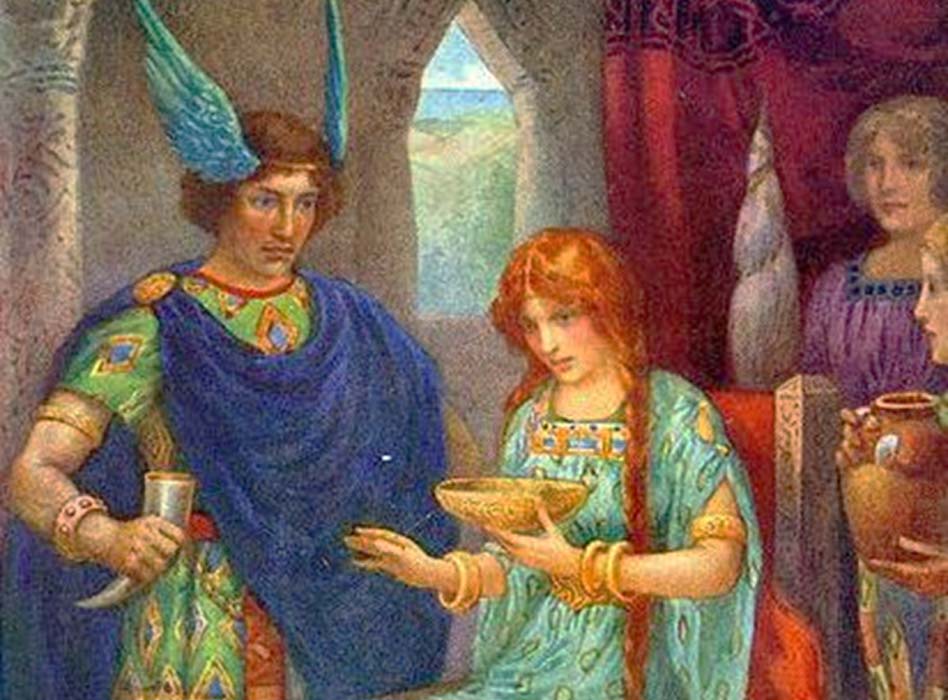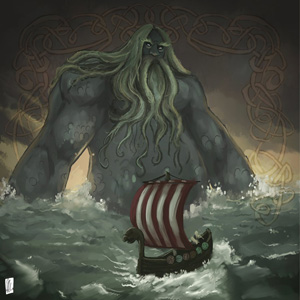Aim: How do we see the theme of sacrifice in Norse Mythology?
Notes For The Day:
Today, we had team 5 presentations on pages 201-228 of Gaiman's Norse Mythology. We started our class discussion with our do now, which asked: "What are some other representations of sacrifice in other mythologies?" My group members and I said an example is how in Greek mythology, Antigone sacrifices herself in order to carry out a proper burial for her brother, Polyneices, despite knowing the possibility that Creon would punish her for this action by killing her. Another example that was mentioned in class was how Prometheus sacrifices himself to give humans the gift of fire. As a result, he was chained to a rock by Zeus as an eagle ate the Titan's liver.

Prometheus sacrifices himself for the benefit of human beings. This is similar to the story of "Hymir and Thor's Fishing Expedition" because Thor sacrifices himself when fighting the Midgard Serpent in order to bring the cauldron to host a feast for the gods.
We proceeded the lesson by reviewing "The Story of Gerd and Frey" in the novel Norse Mythology by Neil Gaiman. Frey is the brother of Freya and is the god of prosperity, fair weather, and manhood. Furthermore, in the novel, Frey is depicted as the god with the best reputation among mortals and he will eventually die fighting Surtr, a fire giant with a flaming sword, in the events of Ragnarok, which we learned is a series of events that lead to the destruction of the cosmos and the creatures living in that world due to the lack of a weapon. We went over the events in the story of Gerd and Frey, in which we learned when Frey went to Odin's hall and sat at the Hlidskjalf, the observation point, and looked North to see Gerd, a giant and "the thing he was missing in his life." When he realized he couldn't obtain her hand for marriage because she was a giant and Frey was a god who belonged to the Vanir. However, after not being able to eat, drink, or sleep, Skirnir travels to Gerd and asks for her hand for marriage for him in exchange for a sword as payment for his duty. Immediately, Gerd agrees and states to Skirnir that Frey would have to wait nine days until they get married. We had a group discussion, asking was it reasonable for Frey to give up his sword in exchange for his marriage with Gerd? Why did Gerd make Frey wait for nine days? After watching a video, what are the key differences between the video and the book? After discussing with my group members, we said that it was not reasonable for Frey to give up his sword because, without the sword, he would be unable to hold off the ruler of Muspell, Surtr, which would cause other gods to be harmed. Gerd made Frey wait nine days because she wanted to get back at them for Skirnir threatening her to marry Frey and if not, he would use his magic on her and impose curses.

Freyr and Gerd
Nine is an important number in Norse mythology because there are also nine worlds in Norse mythology and it represents magic and sacrifice, key themes of these pages. Other occurrences include sacrificial feasts lasting for nine days, involving nine sacrifices in Norse legends. The difference between the video and the book that I saw was how in the video, Gerd does not say yes to marrying Frey immediately and she only says yes to marriage to Frey after Skirnir had threatened to use magic against her. In contrast, in the novel Gerd is joyful when Skirnir approaches her with the news as the book states, "Gerd smiled, and her eyes shone with joy" (page 208).
The group introduced the next story, "Hymir and Thor's Fishing Expedition" by briefly examining Thor's character. For example, he is the son of Odin, the god of thunder, lightning, storms, sacred trees, and strength. He is destined to kill and die fighting the deadly serpent Jormungandr. Therefore, Thor is destined to fight Jormungandr during Ragnarok. Reviewing the story of Hymir and Thor in the fishing expedition, Thor wants the giant, Aegir, to host a feast for the gods but this required a cauldron big enough to brew ale for all the gods. They travel to Hymir's house to obtain his cauldron but end up consuming the food that was meant to last them several days.
They go fishing the next day for dinner and Thor rows to an area where Jormungandr lives. When Hymir cuts the fishing line and therefore, not defeating Jormungandr, Hymir comes up with the proposition that if Thor could break his favorite mug, he will give the cauldron. Eventually, Thor is successful to get the cauldron by breaking the mug on Hymir's head.

This illustration depicts Aegir, a giant who could live alongside the Aesir gods well. Aegir was the Lord of the Ocean and thus, highly respected by the Vikings.
In the group discussion, I said that deception can be used as a means to the ends if no one is being harmed. However, Thor could've handled the situation differently by telling Hymir that he knew how the break the rock without killing the giants that chased him. Overall, Thor still attempted to face the Midgard Serpent because Thor has hubris, or excessive pride, as we discussed in previous lessons. He believed that he was able to take down any enemy despite how powerful they are.
Reflection of the Day's Lesson:
After discussing the two events, I learned that in the real world and in life, there are times when you must sacrifice something whether for personal gain or the greater good. Furthermore, I learned that you never know the true value of something until you no longer have it. For example, in the story of "The Story of Gerd and Frey," Frey gives away his sword to Skirnir to thank him for getting Gerd's hand in marriage. The consequences of his actions were negative as Ragnarok was coming and he didn't realize he needed the sword until "the sky splits asunder and the dark powers of Muspell march out on their war journey..." (page 209). It was also important for me to recognize that despite being faced with challenges, true bravery and consistency even though it comes from pride is a characteristic that Thor upheld and a lesson that as students, we can take away. This idea of perseverance despite adversity is crucial because as someone who is constantly learning, humans should constantly promote good morals and volunteer to benefit the world despite the tough obstacles that we encounter. Another reason why I learned that we should approach challenges with courage is to show that in Norse mythology, the gods resembled humans more than Greek mythology because although they were seen as ideal and respected as a higher power, these gods also faced difficulties when trying to achieve their goal such as Thor trying to get the cauldron. Still, he did not hesitate to stop fighting for the benefit of the other gods and for them to feast. As a result, he used his strength to tire and almost defeat Jormungandr. In Norse mythology, these gods exhibited human characteristics because they believed that the world would eventually end, focusing on gods they could relate to. Thus, as humans and Norse recognize similarily, there isn't necessarily a perfect world as they know the world will eventually end. I will use what I learned by applying these life lessons to experiences in the real world. For example, if I perform poorly on an exam, I will use this lesson to motivate me to study harder, review the information I may have missed, and adopt this new behavior to all future tests in school. Another example in which this lesson can be applied is despite wanting to stop running the immediate second I'm exhausted during training for a sport, I will persevere and finish the finish line with my goal to not give up in mind. Thus, perseverance taught me to develop the determination to succeed in any and all the challenges I come across in my life experiences.

Norse Mythology consists of tales of various deities, beings, and heroes derived from the folk tradition, archaeological representations, and other numerous sources.
Additional information about The Story of Gerd and Frey:
Additional information about Hymir and Thor's Fishing Expedition: https://www.youtube.com/watch?v=dk1FJSpnWZU
Additional information about the history of Viking culture, Norse Mythology, and Norse gods and goddesses such as Thor and Freya:
No comments:
Post a Comment